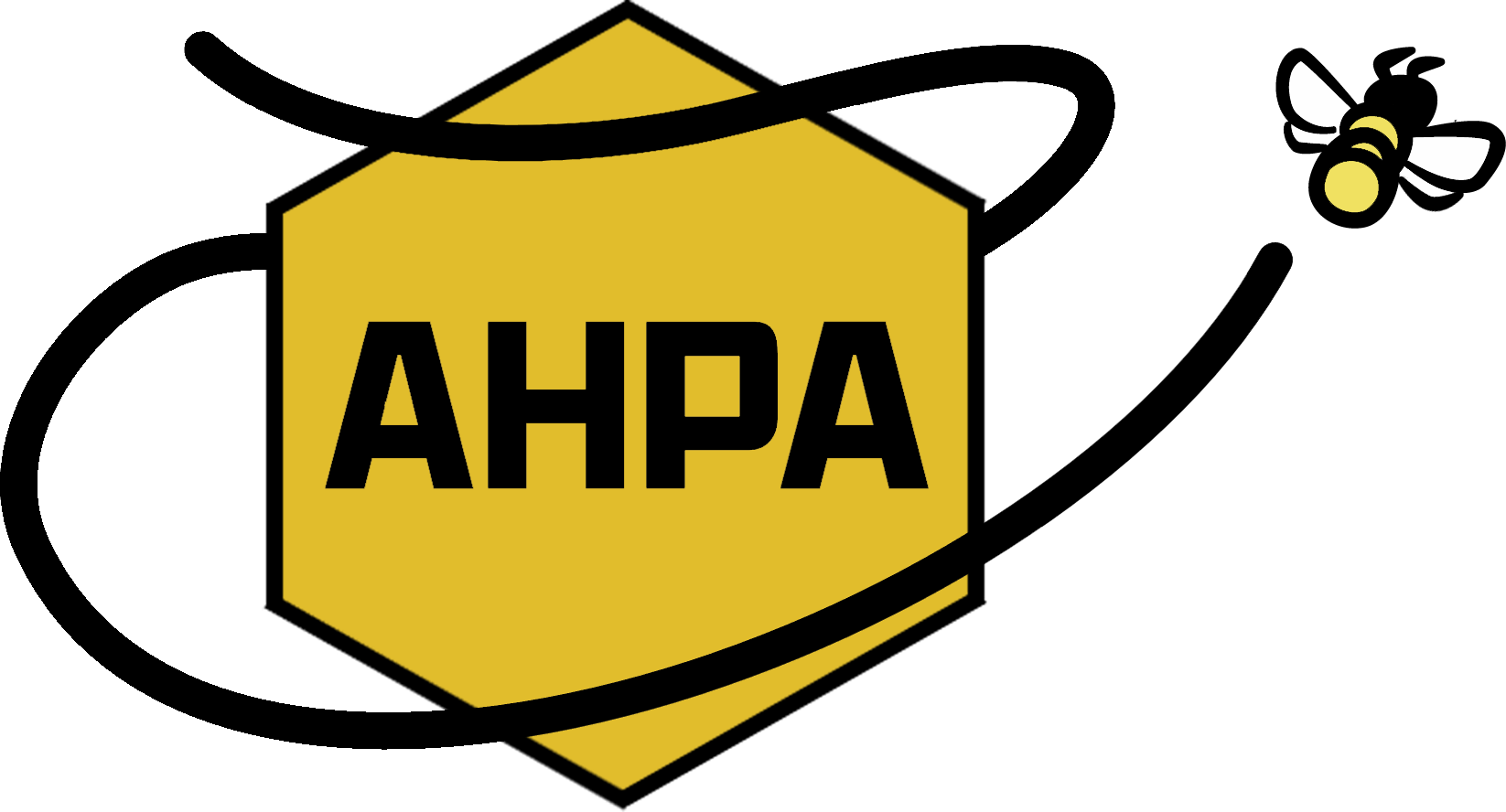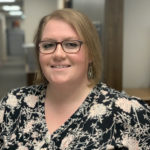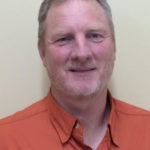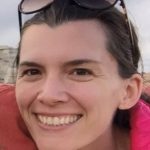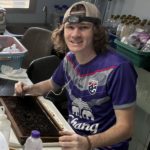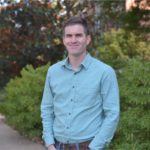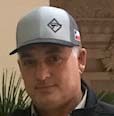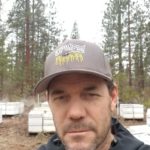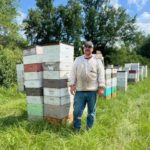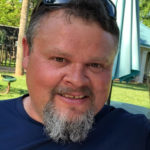AHPA 2024 Convention SPEAKERS

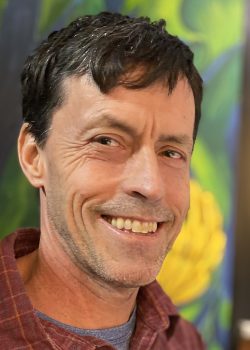
Keynote - USDA-ARS Research Portfolio - 9:30am Dec. 4, 2024
Dr. Jay Evans - USDA-ARS, Beltsville,MD
Talk Description: A summary of USDA-ARS current research priorities with an opportunity to discuss with AHPA pressing and practical needs for the industry. Discussions and needs will be conveyed to Dr. Kevin Hackett, Crop Production National Program Leader, and USDA more broadly. The talk will focus on the main challenges to honey bee health and industry and highlight research targeting disease management, breeding, climate, and chemical stress.
Bio: Jay Evans is a Lead Scientist with the USDA-ARS Bee Research Laboratory (Beltsville, MD) He started studying insect colonies in college (Princeton University) and graduate school (University of Utah) while pursuing degrees in genetics and behavior. His research revolves around interactions between bees and the pathogens and parasites that torment them. He is especially focused on safe medicines and management strategies to reduce the impacts of bee disease. Along with trying to push the needle towards better honey bee survival, he argues that honey bees are a key part of human lives worldwide, as a form of equitable farming that gives much from small initial investments. He is thus keen on promoting honey bees and beekeeping as a sustainable part of nature and human health. He has received USDA awards for ‘Early Career’ (2003) and ‘Senior’ (2023) Scientist of the Year, the EAS James Hambleton Award for Bee Research, and is a Fellow in the American Association for the Advancement of Science. He writes a monthly research column for Bee Culture magazine (www.beesfoundintranslation.org) and enjoys frequent talks with beekeepers.
Keynote: Old Comb and Toxic Chemical Interactions In Our Colonies, 8:30am Dec. 5, 2024
Bob Binnie, Blue Ridge Honey Co, GA
Talk Description: An overview on how the physical properties of old comb and the synergistic interactions of the chemicals present in old comb can severely impact our colonies.
Bio: Bob Binnie is a commercial beekeeper and honey packer located in the southern Appalachian Mountains of northeast Georgia and for over thirty years has been doing business under the name of Blue Ridge Honey Company in Lakemont, Georgia. Bob initially became involved with migratory commercial beekeeping in Oregon in 1981 and due to operating as both a pollinator and honey producer has managed bees in nine states. Voted 2003 Beekeeper of The Year in Georgia, Bob has also been President of the Georgia Beekeepers Association, the Northeast Georgia Beekeepers Association and the Macon County Beekeepers Association in Franklin, North Carolina.
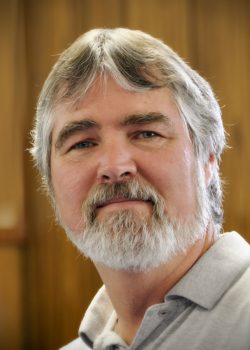
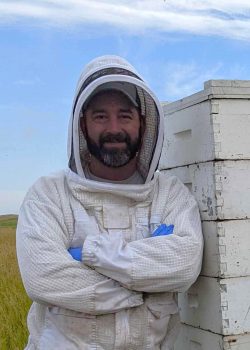
Genetic Tools for Measuring & Managing Amitraz Resistance - 10:15am Dec. 5, 2024
Keynote - Varroa Resistant Stocks and its Place in the Future of Beekeeping - 9am Dec. 6, 2024
Dr. Frank Rinkevich, USDA-ARS, Baton Rouge, LA
Talk Description: Genetic Tools for Measuring and Managing Amitraz Resistance – Amitraz resistance in Varroa has been linked to genetic mutation in the receptor for amitraz. This strong linkage allows us to use genetic tools to better understand how amitraz resistance develops and more accurately measure resistance levels. This talk will explore the utility of using genetic markers to measure how amitraz resistant populations respond to amitraz and non-amitraz treatments, understand the origin and evolution of amitraz resistance at the genetic level, and ultimately how it will be developed as a low-cost service for beekeepers to make real-time decisions on treatment options.
Talk Description: Varroa Resistant Stocks and its Place in the Future of Beekeeping – Varroa resistant stocks offer a genetic basis of Varroa management via many forms of honey bee behavior and offers a long terms sustainable solution to Varroa infestation. In this talk, I will discuss the many behaviors and physiological process that honey bees used to reduce Varroa populations, selective breeding and development of Varroa resistant stocks, and a major update on research on the performance and utility of Varroa resistant stocks in commercial beekeeping operations with our vision for increasing the production and adoption of Varroa resistant stocks through the USDA Areawide campaign coordinated through the Baton Rouge Lab.
Bio: Dr. Frank D. Rinkevich is a Research Entomologist at the USDA-ARS Honey Bee Breeding, Genetics, and Physiology Laboratory in Baton Rouge LA. Frank has extensive training in insect toxicology, biochemistry, molecular biology, and genetics. The goal of Dr. Frank’s research is to provide a basic understanding of pesticide toxicology that is relevant to field conditions in the commercial beekeeping industry. The major focus of Dr. Rinkevich’s research is amitraz resistance in the honey bee parasite, Varroa destructor. This project determining the prevalence and distribution of amitraz resistance in Varroa destructor, developing an international cooperative network for resistance monitoring with bioassays and genotyping, understanding the amitraz use patterns that lead to amitraz resistance, evaluating management practices to overcome amitraz resistant Varroa, and identifying new miticides. Other research interests include evaluating the effects of pesticide exposure on colony survivorship in commercial beekeeping operations, assessing metabolic detoxification of insecticides, establishing the effects of fungicides on colony health, and evaluating the performance of honey bee stocks selected for low Varroa populations in commercial beekeeping conditions.
Speaker - Economics of Mite Control & Mite Resistant Bees in Commercial Operations - 10am Dec. 5, 2024
Dr. Arian Avalos - USDA-ARS, Baton Rouge, LA
Talk Description: Honey bees (Apis mellifera l.) are the premier agricultural pollinators which in the last ~40 years have been under constant survival pressure from the parasitic mite Varroa destructor (Anderson and Trueman). A key strategy to reduce or eliminate Varroa infestation has been the development of multiple honey bee breeding programs to confer resistance. This work examined Hilo honey bees, the result of one of the ongoing breeding programs. We compared colony survival, health, yield, and profit outcomes to show how this specific breeding population retains a profit value in honey production operations while maintaining higher survival and lower Varroa infestation levels than the commercial population. This information can be used by commercial beekeepers to make best management practice decisions and inspire further work examining what trade-offs, if any, are present in this Varroa resistant population.
Bio: Doctor Arián Avalos is a Research Geneticist at the Honey Bee Breeding, Genetics, and Physiology Research (HBBGPR) Unit in Baton Rouge, LA whose work focus on genetic characterization, developing molecular tools to examine honey bee populations, and integration of genetic information and tools for practical application in honey bee breeding. He received his PhD at the University of Puerto Rico, Río Piedras, where he worked on honey bee learning and memory and how it is impacted by social cues. This work was expanded in his Postdoctoral work as an NSF Fellows at the Univerisy of Illinois at Urbana-Champaign, where he first characterized colony defensiveness in gentle Africanzied honey bees in Puerto Rico, then isolated candidate genes mediating intensity of defense. At Baton Rouge, Dr. Avalos works with a variety of honey bee selected populations examining the genetic underpinnings of critical traits such as Varroa Sensitive Hygienic behavior and developing key tools towards establishing genomic-informed selection in honey bees.
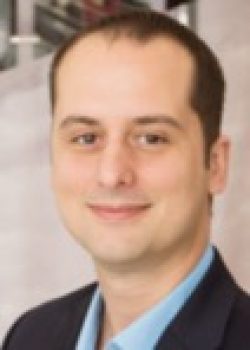
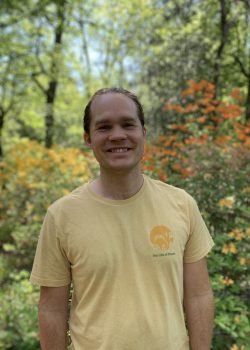
Speaker - Spring & Fall Trials of Alternatives to Bovitraz for Varroa Management - 11am Dec. 4, 2024
Dr. Dan Aurell - Auburn University
Talk Description: In a world with amitraz resistant Varroa mites, it is important to test if other currently available treatments can replace or complement amitraz for Varroa management. This talk presents results from two trials, one each performed during spring and fall in the southeast, in which we compared alternative treatments to amitraz concentrate (Bovitraz). For the fall trial, we combined registered miticides to try to achieve rapid Varroa control, as reported by beekeepers after Bovitraz treatment. For the spring trial, we strategically applied registered natural miticides after starting splits with queen cells. Both trials provide information on ways to diversify miticide use against Varroa.
Bio: Dr. Dan Aurell is a postdoctoral researcher in Dr. Geoff Williams’ lab at Auburn University. His research focuses on managing parasitic mites – the greatest threat to honey bee health – and a tremendous problem for beekeepers. While at Auburn, he tested practical techniques for Varroa management, and has recently worked on Tropilaelaps detection, biology, and management. Dan grew up in Canada, where he started his beekeeping journey by working on a commercial bee farm.
Speaker - Honey Trade Cases - Anti-dumping Suit & Review Updates - 1:30pm Dec. 5, 2024
Melissa Brewer- Kelly Drye
Talk Description: Melissa will provide an update on the latest developoments in the trade case covering imports of raw honey from Argentina, Brazil, India, and Vietnam.
Bio: Melissa Brewer is an attorney with Kelley Drye & Warren LLP and works on trade matters for the Association. Over the past several years, Melissa has been one of the lead attorneys on the trade case covering imports of raw honey from Argentina, Brazil, India, and Vietnam, representing the Association before both the US Department of Commerce and the US International Trade Commission. Melissa is also working on the ongoing appeals that stem from the trade investigations before the US Court of International Trade and US Court of Appeals for the Federal Circuit. Prior to joining Kelley Drye, Melissa was an attorney at the US Department of Commerce.

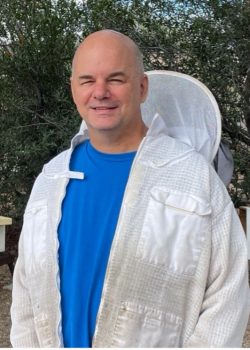
Speaker - The Seasonal Challenges of Honey Bees - Stressors & Solutions for Overwintering Colonies - 11:45am Dec. 6, 2024
Dr. Mark Carroll - USDA-ARS, Tucson, AZ
Talk Description:
Honey bees face ever-changing stressors throughout the year, especially during the period surrounding overwintering. Colonies are taxed not only by cold and extended dearth, but also warm winters with poor forage, and extreme erratic weather made worse by climate change. Here we describe recent projects at CHBRC to better support colonies through seasonal challenges primarily through targeted nutritional supplementation, cold storage strategies, and improved management practices. Workers themselves vary through the seasons with considerably different nutritional needs, physiologies, and task efficiencies in spring, fall, and overwintering workers. Queens and workers show remarkable seasonal flexibility but remain susceptible to winter microbial disruption and queen losses without replacement. One approach has focused on the timing and management of colonies going through cold storage. Cold storage is being used in novel ways to limit losses from warm, forage-poor conditions and force bees to cycle through uniform predictable cold winter conditions. Much of our research has been directed at increasing overwintering nutrition and worker quality, especially in warm winter colonies that typically make fewer winter bees. Several studies have focused on effects of pollen or nutrient supplementation in the critical lead period before overwintering (the period when long-lived winter bees that are being produced). Recent comparisons have been made on the effects of different diet types on seasonal colony performance and survival. A more targeted approach examines the addition of lipid supplements known to provide nutrients that enhance worker quality and performance. Our research aims to provide beekeepers with better and more predictable support solutions during the most difficult period of the annual colony cycle.
Bio: Dr. Mark J. Carroll is a Research Entomologist at USDA Carl Hayden Bee Research Center in Tucson, Arizona who specializes in honey bee nutritional ecology, nutritional physiology, and stressor effects on queens, colony communication, and task coordination. He began his honey bee research at USDA-Gainesville CMAVE in 2006 before joining CHBRC in 2009. His current focus is on how bees experience and adapt to seasonal stressors such as overwintering and forage dearth, with a special emphasis on management solutions to improve bee outcomes.
Speaker: Multiple Approaches to Bee Diseases Prevention & Control - 11:30am Dec. 4, 2024
Dr. Judy Chen - USDA-ARS, Beltsville, MD
Talk Description: The USDA-ARS Beltsville Bee Research Lab (BRL) is committed to tackling the challenges posed by bee diseases, which are driven by a range of pathogens, parasites, and environmental stressors. Through a combination of laboratory and field research, BRL scientists work to advance knowledge and develop innovative technologies and tools for several key areas: 1) diagnosing, treating, and mitigating bee diseases and pests, 2) discovering new compounds for effective Varroa mite control, 3) improving the overwintering success of bee colonies, 4) enhancing queen quality through advanced breeding techniques, and 5) creating nutrition-based strategies for disease prevention and overall bee health. Beyond its research, BRL offers complimentary bee disease diagnostic services to beekeepers and federal and state agencies across the United States. The lab’s significant findings, such as identifying natural substances in pollens and nectars for virus disease control and discovering novel compounds for Varroa control, are expected to make a substantial impact on improving pollinator health and ensuring a reliable supply of bees for both pollination and honey production.
Bio: Yanping (Judy) Chen, PhD, is the Research Leader of the USDA Bee Research Laboratory (BRL) in Beltsville, MD. Judy Chen received her BA from Hunan Agriculture University, P.R. China, her MS from Brigham Young University, and her PhD from Texas A&M University. After completing her postdoctoral research at the University of Maryland Medical School, National Institutes of Health, USDA–ARS Insect Biocontrol Laboratory, she joined the USDA BRL in 2002. Her current research includes investigation of the epidemiology, transmission, and pathogenesis of honey bee viruses and the microsporidian Nosema, development of in vivo and in vitro systems for honey bee virus and Nosema propagation, identification of new emerging viruses in honeybees, characterization of the genomic structures of viruses and Nosema, and development of novel therapeutics for the treatment of honey bee diseases.
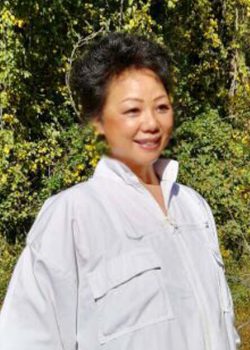
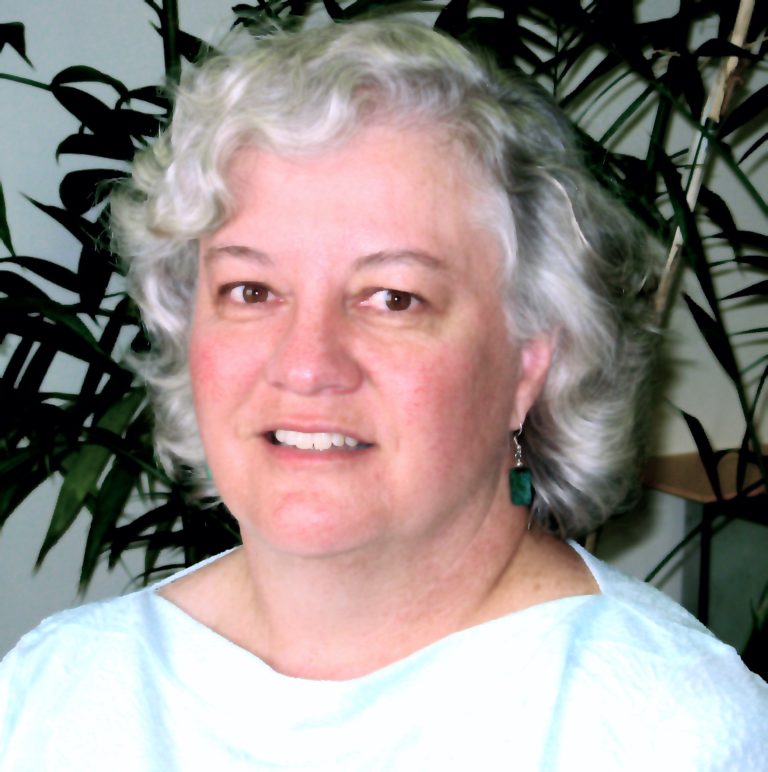
Speaker - Interplay in Stressors in Bees - New Insights & Complexities for Impacts of Pathogens & Pesticides - 11am De. 5, 2024
Dr. Diana Cox-Foster - USDA-ARS, Logan, UT
Talk Description: For all the different bee species, they are impacted by pesticides, pathogens, parasites, lack of floral resources, and climate change. Understanding how these stressors interact and underlie loss of honey bee colonies and decreased populations of bees is critical. At the Bee Lab in Logan, Utah, we have been doing research on pathogens, pesticides, climate change and their interactions. This talk will present the latest results on understanding how viruses impact honey bees and other bee species. I will also discuss our research into pesticides and understanding how they move in the environment to impact honey bees and solitary bees. Lastly, I will present an update on our research to increase bee forage by establishing drought tolerant pollinator plantings.
Bio: Dr. Diana Cox-Foster is a Research Leader and Entomologist at USDA-ARS Pollinating Insects Research Unit (PIRU) in Logan, Utah. PIRU focuses on biology, management, and systematics of all bee species. Stakeholders include bee keepers, bee managers, growers who use Apis and non-Apis bees for pollination, and land managers of natural ecosystems. PIRU has the U.S. National Pollinating Insect Collection, with research on conservation of bee biodiversity. Cox-Foster examines the impact of pathogens and pesticides on bee health, for honey bees, bumble bees, and solitary bees. Cox Foster received a B. S. in Entomology and Zoology at Colorado State University and a M.S. and Ph.D. in Entomology at University of Illinois at Urbana-Champaign. Cox-Foster gained skills in molecular biology as a post-doc at Vanderbilt University. In 1987, Cox-Foster joined Penn State University as a faculty member and served as a full professor. At PSU, Cox Foster was one of the initial scientists responding to colony collapse disorder in honey bees and co-director of the CCD working team. She transitioned to USDA-ARS in October 2015.
Speaker (Sideliner Track) - Breeding Queens for Mite Resistance with 400 Colonies - 3:30pm Dec. 5, 2024
Steven Coy - Coy Bee Company, MS
Talk Description: We will discuss the differences between producing queens and breeding them for mite resistance. We will also show how the Russian Breeders Association measures resistance, maintains diversity and preserves the stock.
Bio: Steven Coy, is a second-generation commercial beekeeper who has served as a member of the American Honey Producers Association’s Executive Committee since 2010 and is the current Vice President for the organization. He is an original member of the Russian Honey Bee Breeders Association, a Past President of the RHBA and co-author of the book “Russian Honey Bees”. Steven and his wife started Coy Bee Company, in 2014 to focus on breeding and selling Purebred Russian queens, nucs, and producing honey from across the Mississippi Gulf Coast.
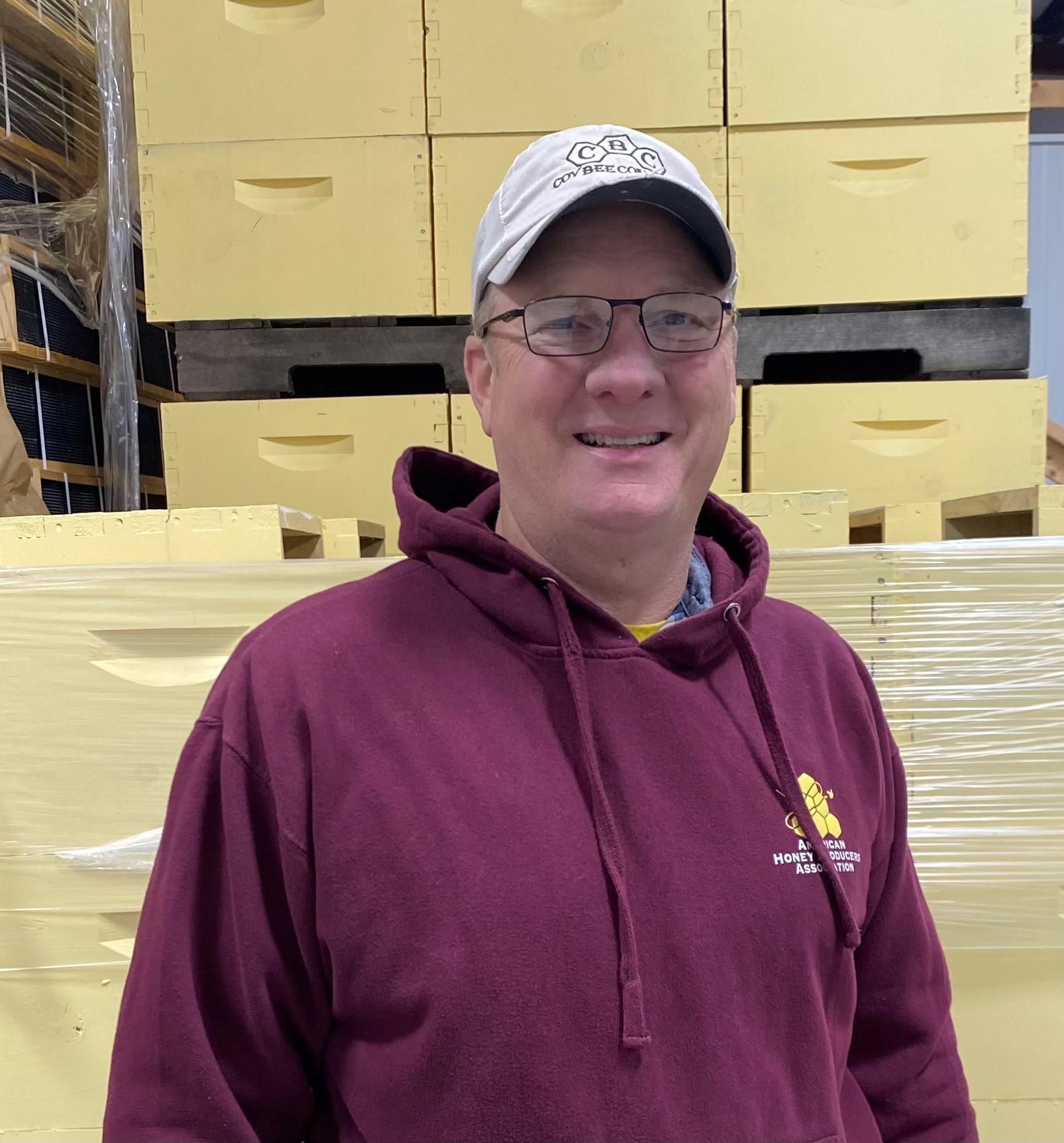
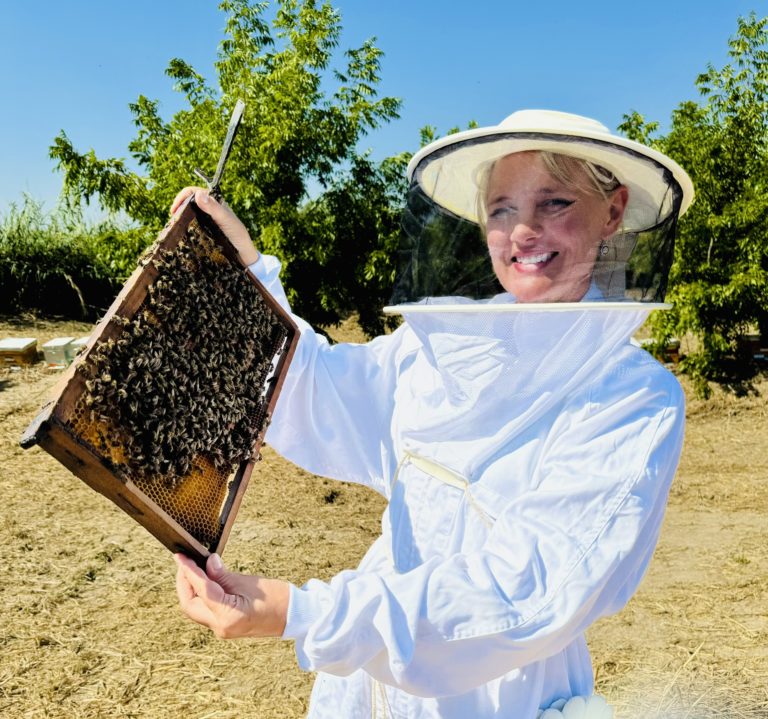
Speaker & Moderator - Addressing Gaps and Emerging Threats - 2:30pm Dec. 4, 2024
Danielle Downey - Project Apis m.
Bio: Danielle Downey began working with honey bees over 30 years ago, including training and research from bee labs in Minnesota, Canada and France, beekeeper education, work with commercial beekeepers and queen breeders, regulatory work as a State Apiarist in Utah and Hawaii, and wrangling bees for TV and film. As the Executive Director of Project Apis m., a nonprofit that funds applied honey bee research, she works closely with many industry stakeholders in the USA and Canada. She has worked on breeding Varroa resistant bees in Hawaii for over a decade.
Speaker - Developing Novel Queen Treatments & Identifying New Miticide Targets - 11:30am Dec. 5, 2024
Dr. Julia Fine - USDA-ARS, UC Davis, CA
Talk Description: One of the ongoing projects at the USDA-Agricultural Research Service worksite in Davis, CA is to investigate the role of juvenile hormone in honey bee queen reproduction to better understand how to optimize queen fecundity and colony performance. This work has yielded promising findings both in the lab and field that may open new lines of research and lead to the development of novel tools and recommendations to aid beekeepers. Additionally, the Davis worksite has been working to characterize a detoxification pathway in Varroa that may lead to the development of novel miticide formulations. This talk will give an overview of this research, describe the progress that has been made, and discuss how these findings can be leveraged to generate beneficial treatments and tools to improve colony survival and productivity.
Bio: Dr. Julia Fine is the Research Entomologist at the USDA-ARS Invasive Species and Pollinator Health Research Unit, Davis, CA. As an entomologist specializing in honey bee reproduction, behavior, and toxicology, I study how environmental and physiological factors affect queen health and fecundity and how aspects of Varroa physiology contribute to their susceptibility to miticide agents.
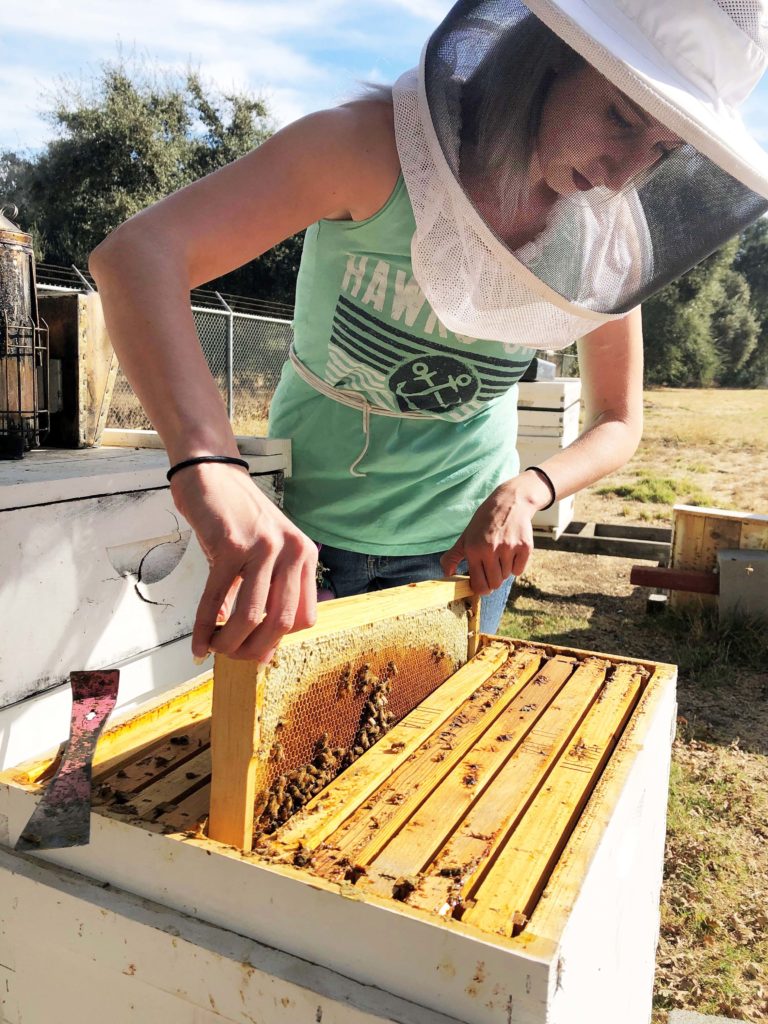
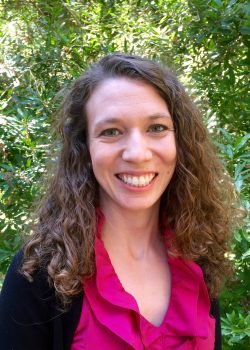
Speaker - Economics of Honey Production - 2pm Dec. 5, 2024 & Economics of Almond Pollination - 11:15am Dec. 6, 2024
Dr. Brittney Goodrich - University of Illinois
Talk Description: Economics of Honey Production – This presentation will summarize trends in data related to the economics of honey production, including honey prices, international honey trade and domestic honey production.
Talk Description: Economics of Almond Pollination – This presentation will cover the outlook for the 2025 almond pollination services season, including a discussion of the supply of and demand for colonies and entering into profitable almond pollination agreements.
Bio: Brittney Goodrich is an Assistant Professor in the Department of Agricultural and Consumer Economics at the University of Illinois at Urbana-Champaign. She grew up in a rural farming community in Iowa where uncertainty in agricultural production and marketing influenced family and friends on a daily basis, consequently leading to her current research interests. Dr. Goodrich obtained a BS in Math and Economics at Iowa State University and Masters and PhD degrees in Agricultural Economics at University of California, Davis. Her research and extension program focuses on how farmers and beekeepers address risk and uncertainty in their operations, enhancing the long-term sustainability of these industries. A primary topic of interest is the use of contracts between almond growers and beekeepers in the almond pollination market, where the precariousness of honey bee colony health makes contracting practices important to grower and beekeeper profitability.
Speaker (Sideliner Track) - Upgraded IPM Strategies - 4:10pm Dec.5, 2024
Nick Groenhof- Shoreline Honey Farm, MI
Talk Description: This talk will address a mindset shift in colony IPM when scaling hive numbers. Considerations for a different way to approach pest management, sick colonies and more efficiency when treating and testing larger number of bees.
Bio: Nick Groenhof has been keeping honeybees since he was ten years old. He started Shoreline Honey Farm Located in Hudsonville MI, in 2009. He runs 2,500 hives for honey production. He also provides pollination for almonds in California, and pollination for cherries, apples, blueberries, squash, and pickles in Michigan. He and his wife Kassandra have five children, three girls and two boys, ages 12 to 3.
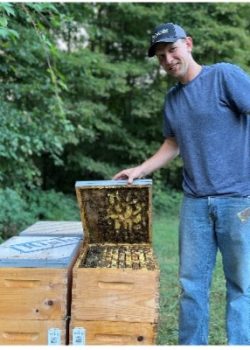
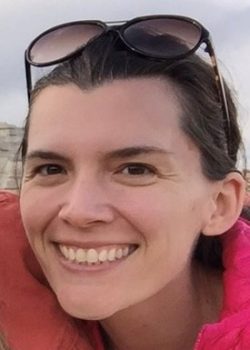
Speaker - USDA Updates in a Nutshell - 9:45am Dec. 5, 2024
Elizabeth Hill- USDA
Bio: Elizabeth (Izzy) Hill is the USDA Pollinator Coordinator for the Office of the Chief Scientist (OCS). In this role, she promotes collaborations and innovations with USDA offices, federal agencies, the commercial pollinator industry, and USDA grant recipients to support all aspects of pollinator health. Prior to her current role, Izzy was involved in various honey bee and pollinator initiatives at USDA’s Office of Pest Management Policy, the Environmental Protection Agency’s Office of Pesticide Programs, and the University of Maryland as a Cooperative Extension Agent.
Speaker - Impacts of Commercial Pollination Routes on Colony Health, 4:30pm Dec. 4, 2024 & Micronutrient Needs & Long-Term Impact of Artificial Feed on Honey bee Colonies in Stressful Field Conditions - 9:45am Dec. 6, 2024
Dr. Brandon Hopkins, Washington State University, WA
Talk Description: Impacts of commercial pollination routes on colony health – The movement of colonies, whether following the honey flow or providing pollination services, is a crucial aspect of commercial beekeeping. However, as colonies are transported throughout the season, they encounter various stressors that can lead to weakened or dead colonies. This presentation will examine data on the risk quotients associated with pesticide exposure during four key pollination events in the season. Additionally, we will explore how the frequency of hive movements impacts colony mortality.
Talk Description: Micronutrient Needs and Long-Term Impact of Artificial Feed on Honeybee Colonies in Stressful Field Conditions –Honeybees are the only livestock that still depends on access to natural forage (pollen) for growth and survival. We tested newly developed pollen-free artificial diets that sustain brood production, in colonies placed from spring to fall in tented enclosures without access to forage (>120 days; 5 consecutive generations of brood; several replacements of all worker bees in the colony). In the same experimental setup, colonies fed commercially available protein supplement stop producing brood after 2 generations. By omitting individual micronutrients from this nutritionally complete diet, we can determine how important they are in honeybee nutrition. Using this dietary depletion approach we examined the requirement of honeybee colonies for individual pollen phytosterols. We will present data from large field trials (>500 colonies in commercial operations) conducted over the last 2 years in the US. In these trials we evaluated the impact of supplementary feeding on colonies that are stressed in commercial field conditions (fall, winter, pollination).
Bio: Dr. Hopkins is an assistant research professor and Thurber Endowed Chair in the Department of Entomology at Washington State University. His current lab focuses on varroa control, the impact of management practices, and dynamics of honey bee health. He has a passion for developing practical solutions for commercial beekeepers and the industries reliant on them for pollination.
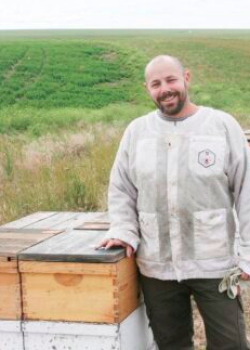
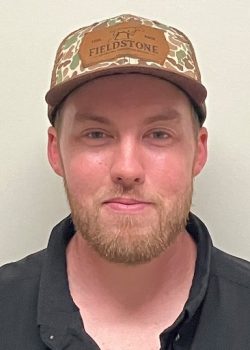
Speaker - Yellow-Legged Hornet Eradication in Georgia Update- 4pm Dec. 4, 2024
Cade Houston- Georgia Department of Agriculture, GA
Talk Description: An update on the Yellow-Legged Hornet Eradication Programon-going efforts in Georgia.
Bio: Cade joined the Georgia Department of Agriculture in June 2024 as an Apiary Inspector. Cade is a graduate of Abraham Baldwin Agricultural College. While at ABAC, he started the college beekeeping club. Cade was an intern in the Plant Protection Division in 2019. After graduation, Cade was employed by Texas A&M, Dept. of Entomology, where he was the South Central Region Honeybee Health Field Specialist and also worked closely with the Bee Informed Partnership. Cade also has commercial beekeeping experience, having worked in the industry in honey production, maintaining hives for pollination events, grafting, producing queens for production colonies.
Speaker (Sideliner Track) - At What Point Did Bees Take Over Our Lives? The Journey from 200 to 2,000 - 2:15pm Dec. 5, 2024
Jon Logterman- Logterman Honey, WI
Talk Description: This presentation will summarize some of the challenges of increasing in numbers. We will point to some successes, some things we could (should) have done differently and some lessons we learned along the way.
Bio: Jon Logterman currently owns and operates Logterman Honey, a 1600 colony operation which produces and packages honey in Osseo, WI. He winters bees in south Mississippi and ships bees into California for almond pollination. Jon started beekeeping with 5 colonies in 2008 and in 2019 left his career as an industrial plant maintenance manager to run bees full-time. Jon serves on the AHPA board of directors and is the past president of The Wisconsin Honey Producers Association (WHPA). He has a BS degree in Broad Area Ag from UW River Falls. Jon and his wife Ingrid have 2 daughters Naomi and Bernice.
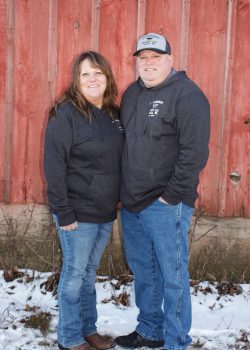
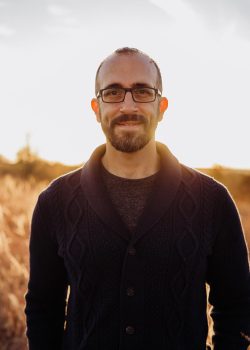
Speaker - The American Honey Institute - 8:45am Dec. 4, 2024
Dr. Bryan McCornack, Kansas State University, KS
Talk Description: Dr. McCornack will speak to the new American Honey Institute in Manhattan, Kansas and how it will bring a fresh approach to the beekeeping and honey production industry. He will share it’s mission, accomplishments to date, and speak to the future.
Bio: Brian McCornack is a Professor and Department Head for Entomology at Kansas State University (K-State) with research, Extension and teaching responsibilities. He is also a Co-Director of Engagement for the Institute for Digital Agriculture and Advanced Analytics (ID3A) at K-State. He has an integrated research program that facilitates the discovery and application of tangible solutions to emerging pest and beneficial insect issues, including endemic and invasive species impacting soybean, corn, sorghum, wheat, and other major crops across the Southern Great Plains. McCornack has developed a wide range of Integrated Pest Management (IPM) tools for use in commercial agriculture, including widely adopted economic injury levels and thresholds for invasive species, sampling plans for key agronomic pests, and sampling strategies for managing economically important species, natural enemies, and pollinators using computer vision. He is leading the development of the American Honey Institute partnered with the American Honey Producers Association and Valor Honey to elevate the beekeeping and honey production industry to a new and exciting level.
Speaker - The Miksa Family History - 3:30pm Dec. 5, 2024
Theodore D. Miksa, Miksa Honey Farms, LLC, FL
Bio: I am 43 years old and the eldest son of David & Linda Miksa and part Owner and Manager of Miksa Honey Farms LLC, a family owned and operated business alongside of my mother Linda Miksa and sister Martha Dresko. Miksa Honey Farms has been operating since 1936 and is now a 3rd generation Beekeeping operation located in Groveland within Central Florida. Since 2016 I have been the active chair of the Florida Honeybee Technical Council representing Florida Beekeepers. Along with being part owner and manager of Miksa Honey Farms I also pack our farms honey for an onsite self-serve honey stand for residents within our community. In my spare time I enjoy spending time with my five children Kayla, Clarissa, Owen, and Emelia and my wife (Bethany Gale) and I’s newborn Isabelle.

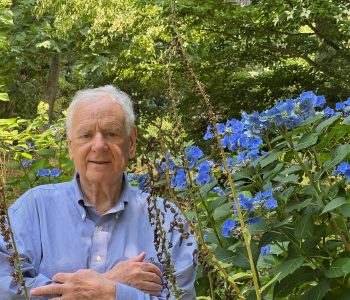
Speaker (Zoom)- Honey Import Updates - 1:45pm Dec. 5, 2024
Ron Phipps, Apimondia
Talk Description: International cooperation is developing among independent scientists and major academic universities addressing the phenomena of economically motivated adulteration of honey in general and in particular Multiple Modern Modes of Adulteration (MMMA)
Bio: Ron Phipps is Vice President of the Beekeeping Economy Commission of Apimondia, Founder and President of CPNA International, Ltd., and presented the “Cosmology of an Infinite, Open and Integrated Universe” at the Institute of Philosophy in Munich in 2023.
Speaker - Connecting the Research of the American Association of Professional Apiculturist (AAPA) with Beekeepers - 2pm, Dec. 4, 2024 & Integrating Rough Hive Bodies in Beekeeping Operation to Improve Bee Health - 10:15am Dec. 6, 2024
Dr. Michael Simone-Finstrom, USDA-ARS, Baton Rouge, LA
Talk Description: Integrating Rough Hive Bodies in Beekeeping Operation to Improve Bee Health – 20 years of research on how and why bees use propolis has led to the development of using rough boxes to promote propolis use by honey bee colonies. Roughened boxes encourage bees to place a thin layer of propolis on the hive walls and has been shown to have various indirect and direct effects on bee health and can ultimately lead to increased colony size. Continuing work, that will be presented here, also shows benefits of using these boxes against Varroa. Additional experiments on the potential of increased propolis in colonies to reduce impacts of European foulbrood and viral infections, specifically during and post-blueberry pollination will also be discussed.
Bio: Dr. Michael Simone-Finstrom is a Research Molecular Biologist with the USDA-ARS Honey Bee Breeding, Genetics and Physiology Research Unit in Baton Rouge, LA. His research has focused on individual and social mechanisms of disease resistance, including resin/propolis use, hygienic behavior and genetic diversity. His current work aims to add to this line of research by more fully understanding how these traits work in concert in order to promote them within the beekeeping industry and identify components of viral resistance in honey bees.
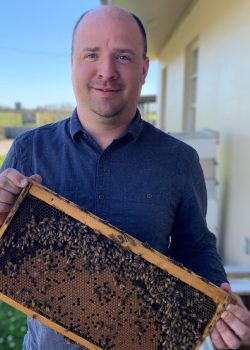
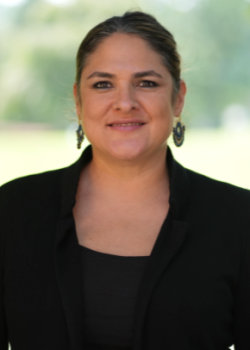
Speaker - Liquid Gold: A Crash Course on the Types and Properties of Texas Honey - 2:30pm Dec. 5, 2024
Dr. Juliana Rangel-Posada
Talk Description: In this presentation, we will discuss the different properties of honey and the pollen therein, and how to identify floral origin and sugar composition in honey. We will then delve into the results from a grant funded by the Specialty Crops Block Program from the Texas Department of Agriculture, which the Rangel research program and the Texas Beekeepers Association received a few years back, to explore the floral origins of honey samples collected by beekeepers that participate in the Real Texas Honey program.
Bio: Born in Colombia, Juliana obtained a B.S. in Ecology, Behavior, and Evolution in 2004 from the University of California, San Diego. In 2010 she obtained a Ph. D. in Neurobiology and Behavior from Cornell University in Ithaca, NY. She was an NSF Postdoctoral Research Fellow from 2010 to 2013 at North Carolina State University. In January 2013, Juliana became Assistant Professor of Apiculture in the Department of Entomology at Texas A&M University (TAMU) in College Station, TX. She was promoted to the rank of Associate Professor with tenure in 2018 and Professor in 2023. Her research program focuses on the biological and environmental factors that affect the reproductive quality of honey bees, the behavioral ecology and population genetics of feral honey bee colonies, and the quality and diversity of honey bee nutrition in a changing landscape. She is an active member of the Texas Beekeepers Association and has been invited to speak at dozens of scientific conferences and beekeeping association meetings across the USA and internationally. She teaches the courses Honey Bee Biology, Introduction to Beekeeping, and Professional Grant and Contract Writing. Since 2014 she has been the coach of TAMU’s undergraduate and graduate teams of the Entomology Games at the branch and national games of the Entomological Society of America (ESA), earning first and second place nationally four years in a row. She is the 2023-2024 President of ESA’s Southwestern Branch and is the past elected chair of the National ESA’s Diversity and Inclusion Committee. She previously served as the elected chair of her department’s Faculty Advisory Committee and has been part of several committees at the departmental, college, and university levels. Most recently, she received the 2023 Distinguished Achievement Award in Teaching from the Southwestern Branch of the ESA. In 2021 she received the James I. Hambleton Memorial Award, which was established by the Eastern Apicultural Society of North America to recognize research excellence in apiculture. She also received the 2020 John G. Thomas Award for Meritorious Service from the Texas Beekeepers Association for her contributions to the apiculture industry in the state. She received the 2019 Dean’s award for Excellence in Diversity and the 2016 Dean’s award for Excellence in Early Career Research from TAMU’s College of Agricultural and Life Sciences. She also received the 2018 Outstanding Achievement in Mentoring award from the Entomology Graduate Student Association. She was 2014 President and 2013 Vice-President of the American Association of Professional Apiculturists.
Speaker - Impact of Commercial Pollination Services on Honey Bee Colony Performance and Forager Behavior - 11:45am Dec. 6, 2024
Dr. Arathi Seshadri, USDA-ARS Stoneville, MS
Talk Description: Honey bees are essential to sustain economic yields of several pollination-dependent crops. This talk describes the impact of pollination services on colony performance and the effect of almond, sunflower and cover crop pollen on forager behavior.
Bio: Dr. Arathi Seshadri is the Research Leader at the USDA/ARS/SouthEast Area Pollinator Health in Southern Crops Ecosystem Research Unit in Stoneville, MS, with a mission to develop strategies for improving the health and conservation of all bee pollinators, so at to benefit beekeepers and farmers. Her research spans the breadth of pollination ecology, exploring agroecosystem-based solutions for improving honey bee health and native bee conservation. She is also interested in understanding the impacts of drought and temperature stress on plant reproduction and plant-pollinator interactions.
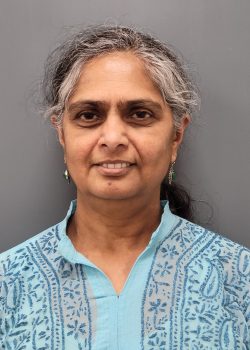
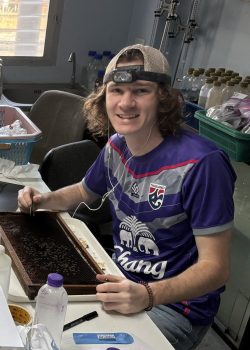
Speaker (AAPA Student Award) - Understanding how Tropilaelaps managment strategies and dispersal can impact eradication efforts - 2:15pm Dec. 4, 2024
Rogan Tokach, Auburn University, AL
Talk Description: Tropilaelaps mercedesae is a parasitic mite of western honey bees that is causing increased concern as it continues its global range expansion into new geographic areas. This talk describes how the combination of a cultural control method (a brood break) and a chemical treatment (either formic or oxalic acid) can effectively manage Tropilaelaps populations, but may not eliminate all mites from colonies. Tropilaelaps dispersal is also covered to explain how mites potentially move between colonies. These ideas are combined to describe the impact that these dispersal behaviors and management strategies may have on future eradication efforts if detected in the U.S.
Bio: Rogan Tokach is a Ph.D. student at Auburn University under Dr. Geoff Williams. His research focuses on developing sustainable parasitic mite management strategies for beekeepers. His work in Auburn involves identifying alternative treatment options for amitraz resistant Varroa mites. He has also had the opportunity to travel to Thailand to conduct research dedicated on filling knowledge gaps concerning Tropilaelaps mite monitoring, detection, dispersal, and management. Rogan completed his master’s degree at University of Nebraska-Lincoln under Drs. Autumn Smart and Judy Wu-Smart, where he studied the impacts a pesticide contaminated environment had on honey bee colony functions. Rogan has 14 years of beekeeping experience at the hobbyist, research, and commercial levels.
Speaker - Yellow-Legged Hornet Eradication in Georgia Update- 4pm Dec. 4, 2024
David Williams, Georgia Department of Agriculture, GA
Talk Description: An update on the Yellow-Legged Hornet Eradication Programon-going efforts in Georgia.
Bio: David joined the Georgia Department of Agriculture as a Plant Protection Field Agent in 1993. Prior to joining Plant Protection, he attended Abraham Baldwin Agricultural College. David has since held positions as a Sr. Inspector, Supervisor, and is currently the Sr. Manager in Plant Protection. David is a past president of the Horticultural Inspection Society (Southern Chapter) and a graduate of the Department’s Leadership Development Institute. David is active in his community. He was elected to the Pierce County Board of Education (GA) where he served as Vice-Chairman. David also serves as Elder in his church. David and his wife, Mynette, celebrated their 25 th wedding anniversary earlier this year and they have two children, Laney and Jackson. David is also a former member of the Professional Rodeo Cowboys Association.
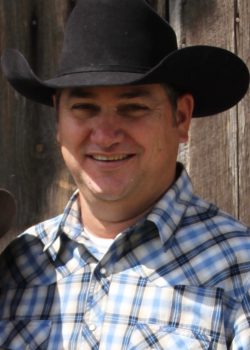
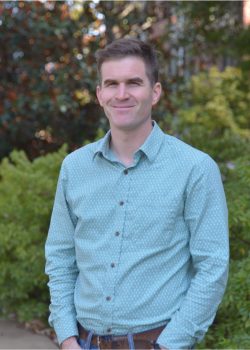
Speaker - Tropilaelaps; A Looming Parasitic Threat We Should Be Preparing for - 1:30pm Dec. 4, 2024 & The 2023-2024 U. S. Beekeeping Survey: Loss Results and State of Varroa IPM - 12:15pm Dec. 6, 2024
Dr. Geoffrey Williams, Auburn University, AL
Tropilaelaps Talk Description: Tropilaelaps mercedesae is a parasitic mite akin to Varroa destructor, an economically important parasite of western honey bees in many regions of the globe. Tropilaelaps reproduces among developing honey bees and transmits viruses like DWV while it feeds. Recent detections of tropilaelaps range expansions into eastern Europe support the need for Tropilaelaps-free regions to take actions to reduce the risk of its arrival, as well as mitigate potential economic consequences should it become newly established. For this talk, Dr. Williams will introduce tropilaelaps biology and management, and then focus on current efforts to develop a sensitive monitoring technique and to train front-line apiary inspectors across the country. This includes developing an online resources page with AIA at https://www.honeybeepests.org/
US Beekeeping Survey Talk Description: Auburn University and the Apiary Inspectors of America launched a new annual survey on managed honey bee colony losses and management for the 2023-2024 beekeeping season. This survey complements previous surveys run by the Bee Informed Partnership, in collaboration with the University of Maryland and Auburn University. For this talk, Dr. Williams will provide an overview of the survey’s preliminary results concerning colony losses, as well as highlight interesting findings connected to varroa integrated pest management. More information about the survey can be found at https://apiaryinspectors.org/
Bio: Dr. Geoff Williams is an Associate Professor at Auburn University, where he directs the Bee Lab. Geoff received his undergraduate degree at the University of Alberta (Canada), and then studied Nosema ceranae biology and management for his Ph.D. at Dalhousie University (Canada). He then jumped across the Atlantic to work on honey bee pesticide-parasite interactions and tropilaelaps mites at the University of Bern (Switzerland) and Chiang Mai University (Thailand) for six years as a research scientist. Geoff joined Auburn in late 2016; he is currently Vice President of the global honey bee association COLOSS and an apiculture subject editor for the Journal of Economic Entomology.
Speakers – Pollinator Stewardship Council Updates – 12:15pm Dec. 6, 2024
Bret Adee, Steve Ellis & Dave Hackenberg

AHPA 2024 Convention PANELS
Tropilaelaps; Learn to Say it and learn to See it!
Panel Description
It is hard to study a pest that isn’t yet in the USA, but taking a lesson from Varroa, we want to be as prepared as possible for this globally spreading mite. These panelists represent multiple efforts to see and study Tropilaelaps, supported by PAm, AIA, and Auburn University. Come hear their message and ask questions about Tropi research and training that has happened this year.

Sponsored by Project Apis m.
Passing the Torch: Strategies & Challenges for
Generational Transition in Beekeeping
Panel Description
The beekeeping industry faces a critical juncture as many family-owned operations approach a generational transition. With the average age of commercial beekeepers around 57, the question of how to successfully hand over these businesses to the next generation has never been more pressing. However, the path to transition is often laden with challenges—ranging from the reluctance of children to take over the business, to difficulties in securing financing for interested young buyers, to the lack of trusted individuals willing to assume ownership gradually.
This panel aims to explore these challenges, offering insights from beekeepers at various stages of the transition process. Participants will include those without a plan, those who have transitioned successfully, and those currently navigating the process. The discussion will provide actionable strategies and real-world examples, offering guidance to beekeepers as they plan for the future of their businesses.

Sponsored by Nectar
